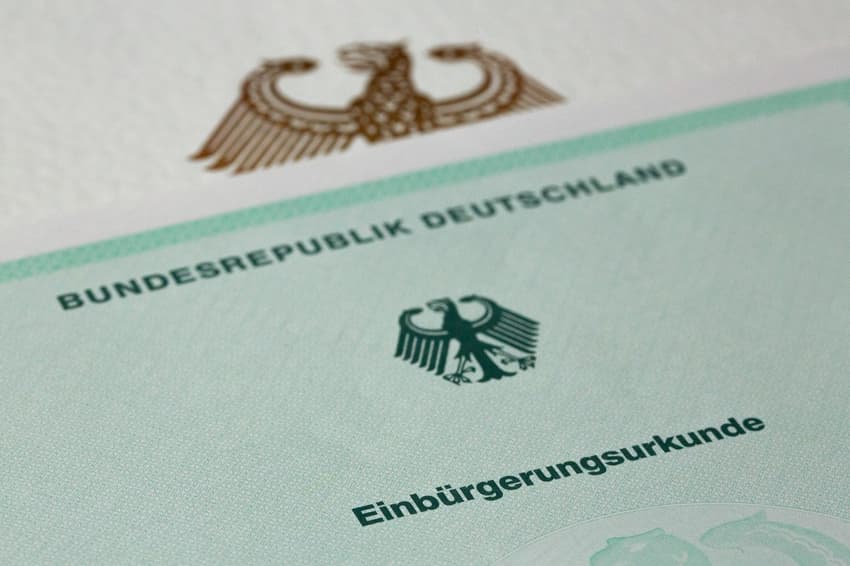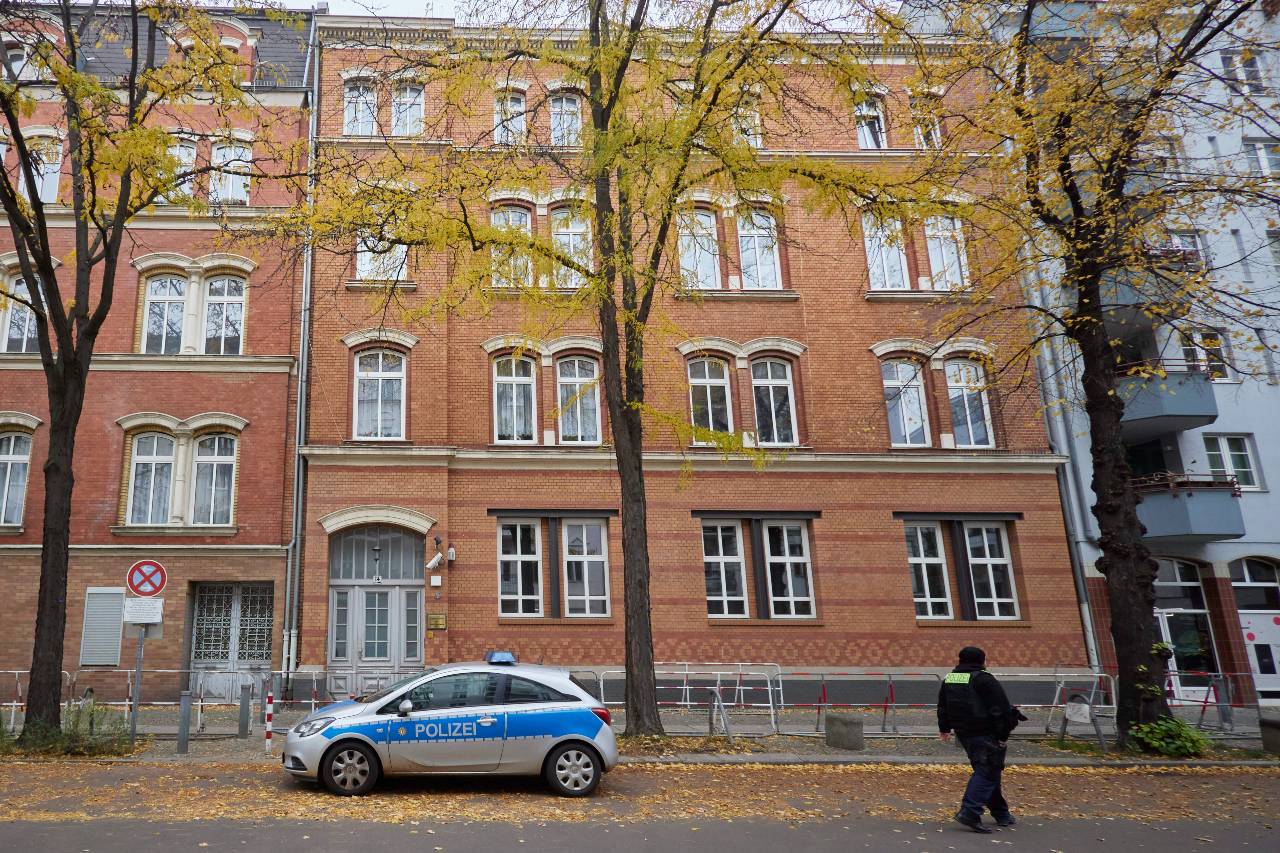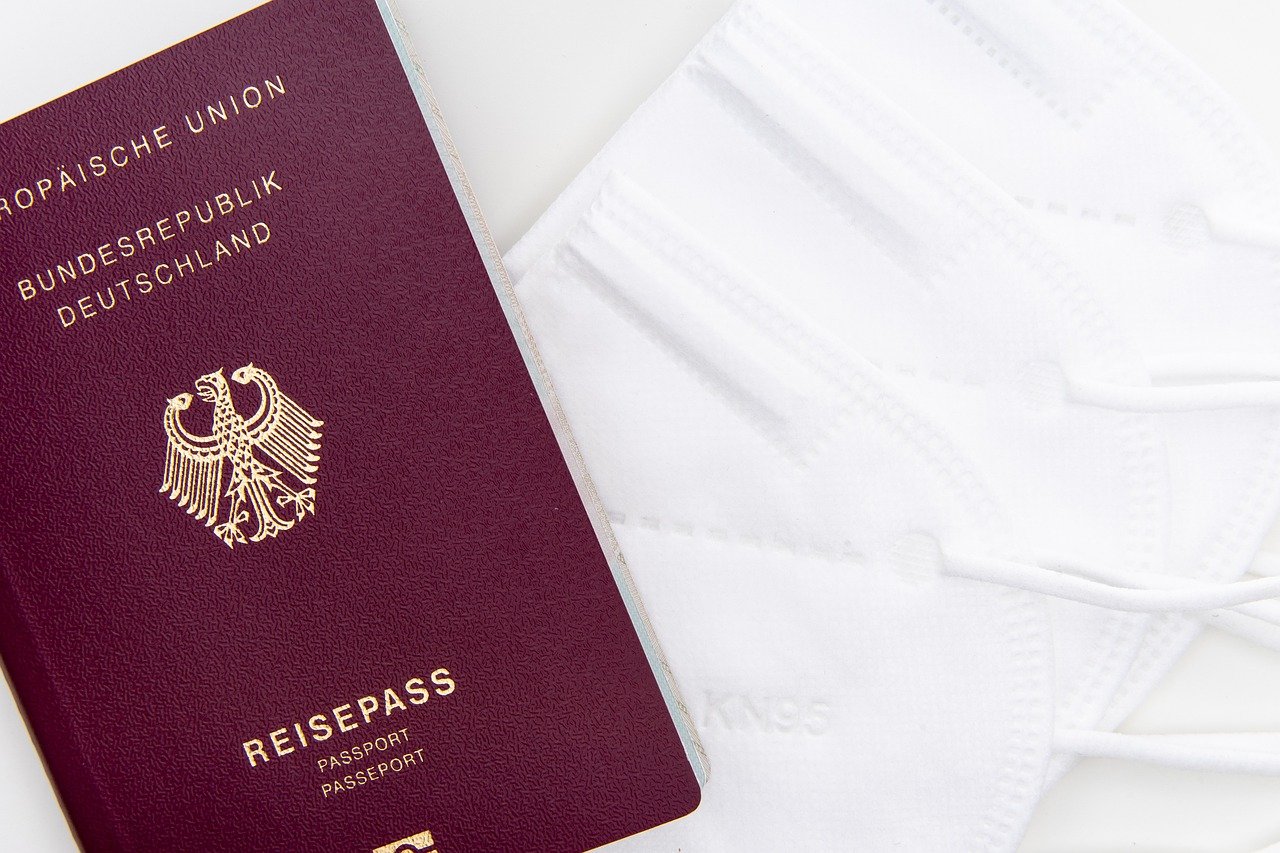How Germany wants to toughen up dual citizenship law around anti-Semitism

Germany's long-awaited citizenship reforms have been put back onto the parliamentary agenda with a number of suggested changes around racism and anti-Semitism. Here's how the process for becoming German could be tightened up in future.
The October 7th terrorist attack on Israel by Hamas gunmen has sent tremors far beyond the Middle East. In Germany, where the security of Israel has been described as the country's Staatsräson, or state purpose, the government has been fervently and unambiguously on the side of the Jewish state.
But amid an outpouring of support for Palestinians in Gaza, where the humanitarian crisis has worsened significantly in recent weeks, there has also been a renewed focus on anti-Semitism in the Bundesrepublik.
Anti-Semitic attacks and threats have been on the rise since the outbreak of the Israel-Hamas war, and solidarity protests in support of Gazan civilians have been accused of harbouring people with anti-Semitic and anti-Israel views.
READ ALSO: Could Germany strip citizenship rights from foreigners over anti-Semitism?
Against this backdrop, the government's reforms to loosen up citizenship rules have come into sharper focus. These include plans to permit dual nationality for non-EU foreigners and reduce the standard residence requirements from eight years to five.
Accusing foreigners from the Near and Middle East and Africa in particular of "anti-Semitism and hostility towards Israel", the opposition CDU has demanded that the citizenship reforms be taken off the agenda. To back up their views, MPs in the conservative party have pointed to the number of people with a migration background demonstrating in support of Palestine.
Within the government, meanwhile, the centre-right Free Democrats (FDP) has questioned whether the current ban on people with racist or anti-Semitic views included in the law goes far enough.
This caused a scheduled first reading of the citizenship bill to be pushed back more than three weeks from November 9th to December 1st - a decision that has potentially thrown the government off schedule in its plans to implement the changes in April 2024.
READ ALSO: INTERVIEW – ‘We are determined to pass German citizenship reforms despite delays’
More significantly, however, a new preliminary version of the law that has been published on the Bundestag website has revealed a number of potential changes that are being debated within government.
Though it's unclear how many of these amendments will end up in the final law, a spokesperson for Filiz Polat, a Green Party MP working on the law, confirmed that "the internal deliberations of the coalition parties are currently still in full swing", adding that rules around anti-Semitism were among the issues being discussed.
What could the government add to the law?
In the original drafts of the citizenship reform, the government inserted a clause to ensure that people who had committed racist or anti-Semitic crimes would be barred from citizenship. In addition, new plans for information-sharing between the criminal justice system and the naturalisation offices were laid out.
In a set of new paragraphs recently included in the preliminary draft and notes on the law, however, the government makes specific reference to the situation in the Middle East.

Police watch a synagogue in Berlin on November 2nd, 2023. Photo: picture alliance/dpa | Jörg Carstensen
"Above all, this regulation was intended to send out a signal," it writes in response to recommendations made by the Bundesrat, or upper house of parliament.
"However, against the backdrop of the attack by the terrorist Hamas on Israel on October 7th 2023 and the anti-Israeli and anti-Semitic cheers in public spaces in Germany, this currently appears to be of even greater importance."
One way the government seems to want to tighten rules is in the investigation of people with racist or anti-Semitic "attitudes" - rather than simply those who commit crimes.
"It is important that people with anti-Semitic, racist or other inhuman attitudes are not eligible for naturalisation," it writes on page 34 of the most recently published draft.
READ ALSO: Who qualifies for German citizenship under the new draft law?
There is also a suggestion that citizenship case workers could follow up on suspicions that a foreigner is anti-Semitic after their initial conversation with the applicant.
"It is true that there is no systematic questioning of all naturalisation applicants in this regard," the draft states. However, if citizenship authorities suspect anti-Semitic views following an interview with the applicant or due to information received by other public authorities, they must ensure that the individual understands the principles of the "free basic democratic order" of Germany and "fulfils the legal requirements for naturalisation".
Analysing the additions, immigration lawyer Sven Hasse told The Local that this would not grant the naturalisation offices any new discretionary powers.
"However, it does specify which investigations the authorities should carry out to find out if the commitment (to the Basic Law) is meant seriously," he explained. "The result of the authority's point of view is fully subject to judicial review."
Hasse also pointed out that a new clause had been added to the law that would place new responsibilities on public prosecutors to investigate anti-Semitic or racist criminal motives.

A German passport. Photo: Markus Winkler from Pixabay
Under this clause, prosecutors would be asked to "evaluate any criminal convictions according to whether they contain facts that reveal anti-Semitic, racist or other dehumanising attitudes and to inform the naturalisation authorities of this upon request," Hasse said.
Though no mention of this has been made in the latest draft, SPD MP Hakan Demir previously told The Local that a formal acknowledgement of Israel's right to exist could also be included in the citizenship process.
"We have to figure out in what way that can enter the new citizenship act, and if it's a good point to do so," Demir said.
This would follow a suggestion made by CDU leader Friedrich Merz, who recently declared that all foreigners should be made to sign a declaration in support of Israel's right to exist before they are allowed to become German.
READ ALSO: CDU leader calls for German citizenship to be allowed 'only with recognition of Israel'
Comments
See Also
The October 7th terrorist attack on Israel by Hamas gunmen has sent tremors far beyond the Middle East. In Germany, where the security of Israel has been described as the country's Staatsräson, or state purpose, the government has been fervently and unambiguously on the side of the Jewish state.
But amid an outpouring of support for Palestinians in Gaza, where the humanitarian crisis has worsened significantly in recent weeks, there has also been a renewed focus on anti-Semitism in the Bundesrepublik.
Anti-Semitic attacks and threats have been on the rise since the outbreak of the Israel-Hamas war, and solidarity protests in support of Gazan civilians have been accused of harbouring people with anti-Semitic and anti-Israel views.
READ ALSO: Could Germany strip citizenship rights from foreigners over anti-Semitism?
Against this backdrop, the government's reforms to loosen up citizenship rules have come into sharper focus. These include plans to permit dual nationality for non-EU foreigners and reduce the standard residence requirements from eight years to five.
Accusing foreigners from the Near and Middle East and Africa in particular of "anti-Semitism and hostility towards Israel", the opposition CDU has demanded that the citizenship reforms be taken off the agenda. To back up their views, MPs in the conservative party have pointed to the number of people with a migration background demonstrating in support of Palestine.
Within the government, meanwhile, the centre-right Free Democrats (FDP) has questioned whether the current ban on people with racist or anti-Semitic views included in the law goes far enough.
This caused a scheduled first reading of the citizenship bill to be pushed back more than three weeks from November 9th to December 1st - a decision that has potentially thrown the government off schedule in its plans to implement the changes in April 2024.
READ ALSO: INTERVIEW – ‘We are determined to pass German citizenship reforms despite delays’
More significantly, however, a new preliminary version of the law that has been published on the Bundestag website has revealed a number of potential changes that are being debated within government.
Though it's unclear how many of these amendments will end up in the final law, a spokesperson for Filiz Polat, a Green Party MP working on the law, confirmed that "the internal deliberations of the coalition parties are currently still in full swing", adding that rules around anti-Semitism were among the issues being discussed.
What could the government add to the law?
In the original drafts of the citizenship reform, the government inserted a clause to ensure that people who had committed racist or anti-Semitic crimes would be barred from citizenship. In addition, new plans for information-sharing between the criminal justice system and the naturalisation offices were laid out.
In a set of new paragraphs recently included in the preliminary draft and notes on the law, however, the government makes specific reference to the situation in the Middle East.

"Above all, this regulation was intended to send out a signal," it writes in response to recommendations made by the Bundesrat, or upper house of parliament.
"However, against the backdrop of the attack by the terrorist Hamas on Israel on October 7th 2023 and the anti-Israeli and anti-Semitic cheers in public spaces in Germany, this currently appears to be of even greater importance."
One way the government seems to want to tighten rules is in the investigation of people with racist or anti-Semitic "attitudes" - rather than simply those who commit crimes.
"It is important that people with anti-Semitic, racist or other inhuman attitudes are not eligible for naturalisation," it writes on page 34 of the most recently published draft.
READ ALSO: Who qualifies for German citizenship under the new draft law?
There is also a suggestion that citizenship case workers could follow up on suspicions that a foreigner is anti-Semitic after their initial conversation with the applicant.
"It is true that there is no systematic questioning of all naturalisation applicants in this regard," the draft states. However, if citizenship authorities suspect anti-Semitic views following an interview with the applicant or due to information received by other public authorities, they must ensure that the individual understands the principles of the "free basic democratic order" of Germany and "fulfils the legal requirements for naturalisation".
Analysing the additions, immigration lawyer Sven Hasse told The Local that this would not grant the naturalisation offices any new discretionary powers.
"However, it does specify which investigations the authorities should carry out to find out if the commitment (to the Basic Law) is meant seriously," he explained. "The result of the authority's point of view is fully subject to judicial review."
Hasse also pointed out that a new clause had been added to the law that would place new responsibilities on public prosecutors to investigate anti-Semitic or racist criminal motives.

Under this clause, prosecutors would be asked to "evaluate any criminal convictions according to whether they contain facts that reveal anti-Semitic, racist or other dehumanising attitudes and to inform the naturalisation authorities of this upon request," Hasse said.
Though no mention of this has been made in the latest draft, SPD MP Hakan Demir previously told The Local that a formal acknowledgement of Israel's right to exist could also be included in the citizenship process.
"We have to figure out in what way that can enter the new citizenship act, and if it's a good point to do so," Demir said.
This would follow a suggestion made by CDU leader Friedrich Merz, who recently declared that all foreigners should be made to sign a declaration in support of Israel's right to exist before they are allowed to become German.
READ ALSO: CDU leader calls for German citizenship to be allowed 'only with recognition of Israel'
Join the conversation in our comments section below. Share your own views and experience and if you have a question or suggestion for our journalists then email us at [email protected].
Please keep comments civil, constructive and on topic – and make sure to read our terms of use before getting involved.
Please log in here to leave a comment.